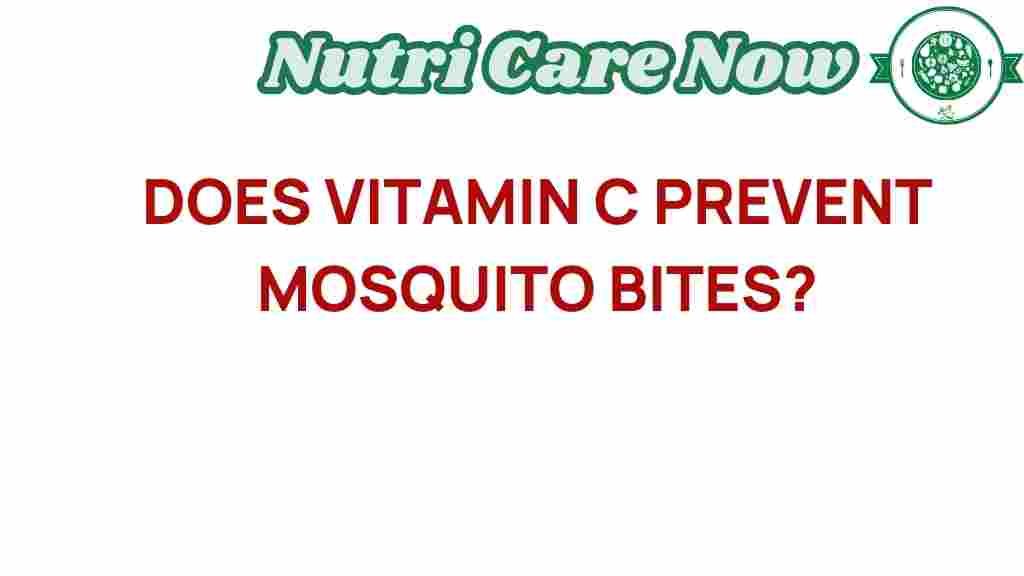Unraveling the Mystery: Does Vitamin C Really Prevent Mosquito Bites?
As summer approaches, many of us look forward to outdoor activities, barbecues, and vacations. However, along with the joys of summer come pesky mosquito bites that can ruin our fun. The search for effective insect repellent options often leads people to explore various natural remedies, one of which is Vitamin C. But does Vitamin C really prevent mosquito bites? In this article, we will delve into the connection between Vitamin C and mosquito bite prevention, examining its health benefits, its role in skincare, and how it fits into an overall wellness strategy for summer safety.
Understanding Mosquito Bites
Mosquito bites are not just an annoyance; they can also transmit diseases such as West Nile virus, Zika virus, and malaria. Understanding how mosquitoes bite and what attracts them can help in developing effective prevention strategies.
- Attraction Factors: Mosquitoes are attracted to carbon dioxide, body heat, sweat, and body odors. They are also drawn to certain colors, with dark colors attracting them more than light ones.
- Feeding Mechanism: Female mosquitoes bite to obtain blood, which they need to produce eggs. Their saliva contains anticoagulants that prevent blood clotting, leading to the itchy bump we associate with bites.
The Role of Vitamin C in Health and Wellness
Vitamin C, also known as ascorbic acid, is a powerful antioxidant that plays a crucial role in various bodily functions. It is essential for:
- Immune Function: Vitamin C boosts the immune system, helping the body fight off infections.
- Collagen Production: It aids in the synthesis of collagen, essential for skin health.
- Antioxidant Protection: As an antioxidant, it protects cells from damage caused by free radicals.
Additionally, Vitamin C has been linked to improved skin health, making it a popular ingredient in skincare products. Its anti-inflammatory properties may help soothe irritated skin, which can be beneficial when treating itchy mosquito bites.
Vitamin C and Mosquito Bite Prevention
The question remains: can Vitamin C actually prevent mosquito bites? While there is limited scientific evidence directly linking Vitamin C to mosquito bite prevention, some studies suggest that certain dietary and topical applications of Vitamin C may have a repellent effect.
Potential Mechanisms
Here are some proposed mechanisms through which Vitamin C might help in preventing mosquito bites:
- Odor Masking: High Vitamin C levels in the body might alter skin odor, making it less attractive to mosquitoes.
- Skin Health: Improved skin health could lead to fewer skin irritations, which might make bites less likely.
- Immune Response: A stronger immune system may reduce the severity of reactions to bites, making them less noticeable.
How to Use Vitamin C for Mosquito Bite Prevention
If you’re interested in incorporating Vitamin C into your mosquito bite prevention strategy, consider the following methods:
1. Dietary Sources
One of the simplest ways to increase your Vitamin C intake is through your diet. Here are some foods rich in Vitamin C:
- Citrus fruits (oranges, lemons, grapefruits)
- Bell peppers
- Strawberries
- Kiwi
- Broccoli
2. Topical Applications
Applying Vitamin C serums or creams to your skin may not only improve skin health but could also provide some level of mosquito bite prevention. Look for products that contain:
- Ascorbic acid
- Magnesium ascorbyl phosphate
- Sodium ascorbyl phosphate
3. Vitamin C Supplements
If you find it challenging to get enough Vitamin C through your diet alone, consider taking supplements. However, it’s essential to consult with a healthcare professional before starting any new supplement regimen.
Complementing Vitamin C with Other Natural Remedies
While Vitamin C may offer some benefits, it’s best to combine it with other natural remedies for effective mosquito bite prevention. Here are a few:
- Essential Oils: Oils like citronella, eucalyptus, and lavender can serve as effective insect repellents.
- Garlic: Some studies suggest that garlic consumption may make your blood less appealing to mosquitoes.
- Apple Cider Vinegar: Applying diluted apple cider vinegar to the skin may help repel mosquitoes.
Summer Safety Tips
To enhance your summer safety measures against mosquito bites, consider the following tips:
- Avoid Peak Hours: Mosquitoes are most active during dusk and dawn. Try to stay indoors during these times.
- Wear Protective Clothing: Light-colored, long-sleeved clothing can help reduce the risk of bites.
- Use Bug Nets: If you’re camping or spending time in heavily infested areas, consider using bug nets around sleeping areas.
Troubleshooting Tips for Mosquito Bites
Even with preventive measures, bites may still occur. Here are some tips for dealing with mosquito bites effectively:
- Wash the Area: Clean the bite site with soap and water to prevent infection.
- Apply Cold Compress: A cold pack can help reduce swelling and itching.
- Use Anti-itch Creams: Over-the-counter creams containing hydrocortisone can relieve itching and inflammation.
Conclusion
In conclusion, while Vitamin C has numerous health benefits and may contribute to overall wellness, there is no conclusive evidence that it can entirely prevent mosquito bites. However, incorporating Vitamin C through diet and skincare may enhance skin health and potentially reduce the attractiveness of your skin to mosquitoes. For effective mosquito bite prevention, it’s best to combine Vitamin C with other natural remedies and follow summer safety tips. Enjoy the summer while staying protected from pesky mosquito bites!
For more information on natural remedies and wellness tips, check out our article on natural insect repellents. And for insights into skincare with Vitamin C, visit this resource.
This article is in the category Health and created by NutriCareNow Team
